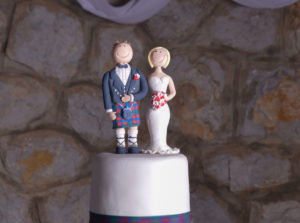Humanist Society Scotland Says “We Do”—50,000 Married So Far

People enjoy marking life’s important occasions and milestones with celebratory ceremonies, such as weddings, baby namings, and other life-cycle events. While many cultures and traditions still incorporate dogma and religious ideology into every ritual and ceremony, the percentage of individuals interested in having personalized and meaningful ceremonies that are free of religion continues to increase, especially in Europe.
In fact, registered celebrants of Humanist Society Scotland (HSS) have married 50,000 people since they were authorized to perform weddings in 2005. To learn more about the organization, humanist ceremonies, and the future of humanism, I had the pleasure of interviewing Lynsey Kidd, HHS head of ceremonies and chaplaincy.
TheHumanist.com: I read that there were more humanist wedding ceremonies than Church of Scotland weddings in 2016. Why do you think humanist weddings have become so popular in Scotland? How do you promote and “normalize” humanist ceremonies?
Lynsey Kidd: Humanist weddings offer couples something really special in that they are unique to the couple, are focused on the couple—their story and all that they want to share—and reflect the beliefs of the couple. With more people in Scotland now identifying as nonreligious but wishing to live ethical and compassionate lives, a humanist ceremony is a meaningful way to reflect that. Scotland is now a majority nonreligious country; our growth is reflected in the change in Scottish society. Our growth is also linked to the increasing number of people who attend humanist ceremonies as guests.
We have never positioned our ceremonies as “wacky,” but as meaningful alternatives to religious and civil ceremonies. Although we sometimes see couples get particularly creative for ceremonies, most are very much organized in a traditional way. In Scotland we don’t believe our ceremonies are for a “niche” or “fringe” group but that they have a central place in Scottish culture. Therefore, we have, with no apology, always presented ourselves that way. What’s important is that people have the choice to have a ceremony that reflects their beliefs and values, conducted by someone who shares those beliefs and values.
TheHumanist.com: What was the process like for the HSS to be granted legal parity with churches? What are the benefits associated with this?
Kidd: HSS was granted legal authorization in 2005 to solemnize marriage in Scotland. The request for humanist marriages to be legally recognized was driven by HSS members who wanted to be married in a way that was reflective of their beliefs and values. The process for this initial change was lengthy, but ultimately concluded that refusal to recognize humanist marriage celebrants was likely to be incompatible with Article 14 of the European Convention of Human Rights and that the Marriage (Scotland) Act 1977 could be read to allow the authorization of humanist celebrants.
On December 31, 2014, the Marriage and Civil Partnership (Scotland) Act 2014 came into force. This act included provision for a new category of marriage—– “belief.” There was a small change to how our celebrants were authorized. However, authorization was still temporary.
In fall 2015 we approached the Scottish government to become prescribed into law. This would change our authorization to permanent and as a group we would be recognized in the Marriage and Civil Partnership (Scotland) Act 2014. We would no longer have to seek authorization from the Registrar General’s office for each individual celebrant. [Rather,] they would, by virtue of being with HSS, have authorization. Becoming prescribed in law would also give us legal parity with the churches.
After many meetings and providing a lot of information about HSS and how we manage our ceremonies provision, a statutory instrument (SI) was laid before the Scottish Parliament in December 2016.
Once laid, the SSI went through two parliamentary committees and finally came into force on February 14, 2017. This was formal recognition by the Scottish Parliament that HSS had a solid place in Scotland and had demonstrated the competence and legitimacy to be written into Scottish law. It was probably the best day of my career so far!
In operational terms, the change in law means a few administrative tweaks including the fact we now manage the authorization of all our own celebrants. The change is far more about our place in Scotland.
TheHumanist.com: Before 2005, did humanist celebrants exist in Scotland?
Kidd: Since 2005 growth has been rapid, but yes, humanist celebrants did exist before 2005, and they were conducting funeral, naming, and (non-legal) wedding ceremonies.
TheHumanist.com: What are the next steps for the humanist celebrants and humanist ceremonies connected with HSS?
Kidd: Our first and ongoing priority is to continue to provide humanists with meaningful ceremonies for all life’s key events that reflect their beliefs and values. We are excited about the future of our celebrants and ceremonies and are looking forward to new celebrants joining our team.
